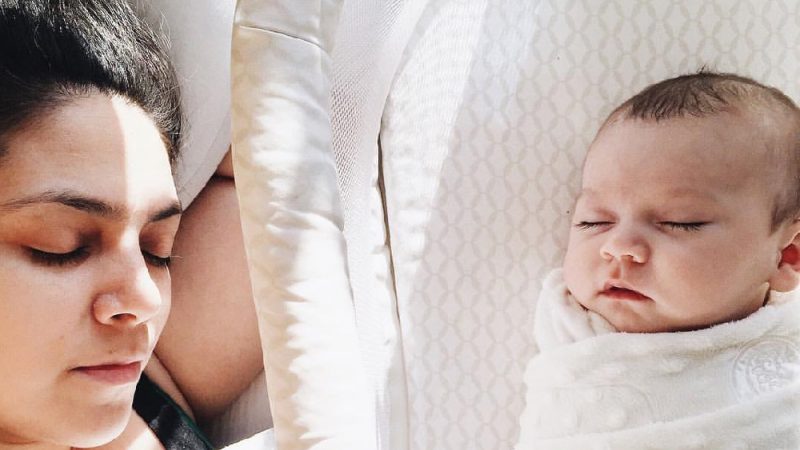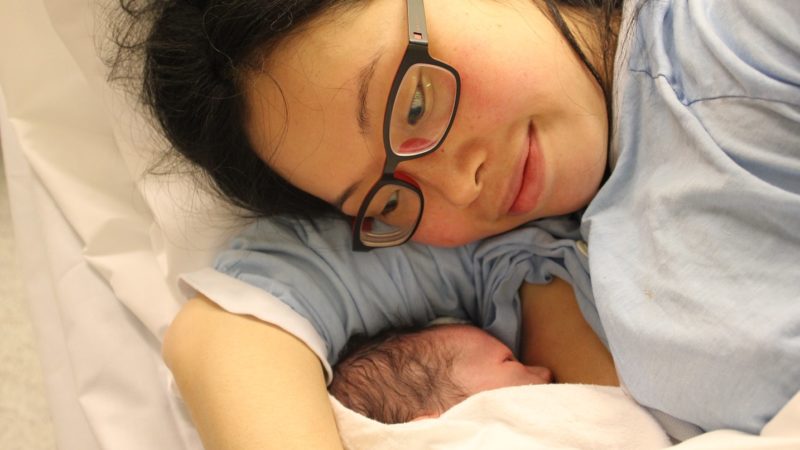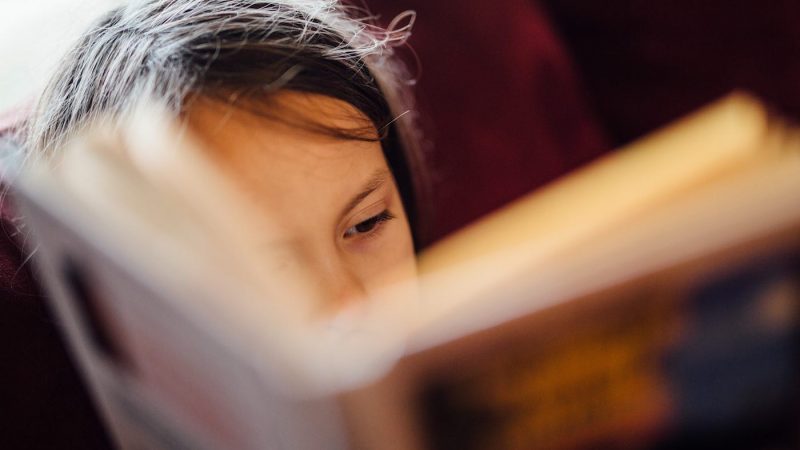
Q&A with infant sleep scientist Prof. Helen Ball
Photo credit: “I never thought I’d be into co-sleeping but I’ve really loved it!” by Valerie Hinojosa shared under CC licence 2.0.
Is it OK to nurse a baby to sleep? Should I stick to a routine or go-with-the-flow? How can I get my toddler to sleep? (Please, please make my toddler sleep!)
Sleep Scientist Professor Helen Ball joined us this week for Parenting Science Gang’s first live web chat to answer these questions and more, drawing on her nearly-20-years of research into infant sleep.
Helen is Director of the Parent-Infant Sleep Lab at the University of Durham and the lab also runs the Infant Sleep Info Source website. Her research includes a focus on bedsharing/co-sleeping and the relationships between sleeping and feeding. She has also looked at how parents understand safe sleeping guidance for SIDS reduction and her work has informed a bunch of statements, policies and recommendations by different organisations, both in UK and around the world.
Click below to jump to the topic that interests you:
- Swaddling
- Breastfeeding and sleep
- Bedtimes
- Controlled Crying / Cry it Out
- Cosleeping
- Where to sleep?
- How much sleep?
- And finally … are we obsessed with sleep?!
Swaddling
Q. Swaddling: is it a good idea?
Is there any research into swaddling? I think it’s like something from a medieval setting, but my mum swears by it!
Helen: Swaddling is a controversial one. some people think it ‘mimics the womb’, but others feel it is like putting a baby in a straight-jacket! Swaddling certainly has deep historical roots, and has been widely used across cultures. Some babies seem to love it, and others hate it, but it is really only suitable for the first few months — once babies start to roll it should be stopped.
Breastfeeding and sleep
Q: Is breastfeeding to sleep a bad habit?
Should we follow ‘feed, play, sleep’ routines recommended in books instead?
Helen: Nursing to sleep is not a bad habit in my book. Biologically it is a key method for helping babies relax (oxytocin) and feel secure so they can drift off.
If you are happy nursing her to sleep there is no good reason not to. Often we are told we are creating ‘bad habits’ but this is a very culture specific view. Most babies and small children around the world nurse to sleep and mothers wouldn’t dream of doing anything else!
There is no research evidence underpinning feed/play/sleep routines! Biology encourages babies to sleep after they feed – why undermine that? The feed/play/sleep schedule assumes babies have to ‘learn’ to sleep, but they absolutely don’t! They know how to sleep and are born knowing how to sleep! We just need let them sleep when they are sleepy ?
Q. At what age (if any!) would you worry about a toddler not settling / sleeping through without breastfeeding?
Helen: Nursing to sleep is really a personal issue. Some mums and babies are happy to continue night-nursing into preschool years. Others want to night wean long before then. It is only an issue for the child if the mother is not happy with it.
Bedtimes
Q. Routine or go-with-the-flow?
Is it important to have a routine or a plan for naps and sleep (is it even possible to follow such a plan while practicing gentle parenting) or is it ok to follow baby’s cues?
Helen: I always advocate following baby’s cues rather than imposing a routine — the former works with the baby’s biology while the latter tries to force biology to fit an artificial timeline. It also is very constraining for the family to live life around the baby’s sleep schedule. Do whatever you need to do and let her fall asleep on the go as needed. Babywearing really helps with this!
Q. My toddler’s bedtime takes hours! What can I do?
I’m happy to continue feeding, but we’ve struggled for a long time with bedtimes taking literally hours. Since about 2.5 years old, bedtime is much much shorter if he doesn’t nap, but some days he clearly still needs the nap!
So it’s a tricky balancing act – I’m worried about the effect of keeping him from napping in the daytime, but also the effects on all of us of bedtime taking two or three hours! The nursing is the least issue really
Helen: How long he naps is key: the thing is to not have a mini night-time sleep in the middle of the day — just enough sleep to get over the immediate sleep pressure — but it needs to keep rising to the night-time for sleep to happen easily
Q. How to help a wakeful toddler to sleep better?
My nearly 2 year old wakes hourly no matter what we try. I don’t want to do CC [controlled crying] or CIO [cry it out] because they aren’t my thing. Is there a way I can help him sleep better? He’s always tired from such poor sleep.
He goes to bed at 7pm, he’ll then sleep well until around 11 when the wake ups start. He gets up around 5am when he wakes everyone. He has one nap on the morning school run around 9am he’s so tired by then he falls asleep in the car.
Helen: It might be worth trying to push back your son’s bedtime by a couple of hours for a week or so to see whether he will then sleep longer during the night/later in the morning. If he does, you can then gradually bring his bed-time earlier
Q. Any tips on getting a wakeful toddler to settle without co-sleeping?
Really struggling with my 14m old. He seems to have hit a sleep regression and has gone from sleeping through, to waking 3 times a night. He will only settle with breastfeeding. I then transfer him back into his cot from my bed.
Any ideas on how to help him settle? I really don’t enjoy co-sleeping.
It would be nice if his dad could settle him too. I’m trying to get out of co-sleeping, I find it so uncomfortable and gives me feeding aversion
Helen: The sleep development path is not linear and straight 🙂 although we might wish babies will start to sleep for longer and longer stretches with no blips it is rarely the case
If you want him to go to bed without breastfeeding you will have to show him that there are others ways to fall asleep – and be consistent in encouraging him to do so for all his sleeps. Breastfeeding to sleep is really easy – it makes babies drowsy, so it is easy and comfortable.
Dad is likely to be the best solution here — he can teach him that he can relax and sleep and be comforted without feeding — so I would suggest getting Dad to take over bedtimes for a while.
Try working out how/when it is best to feed so he doesn’t fall asleep while feeding so Dad can help him go to sleep. Some expressing might be involved for a while.
Q. How to support tearful 9 month old at bedtime?
I have a 9 month old daughter who really fights sleep especially if not breastfed to sleep! Looking for advice on calming her down before bed. We have a good routine it’s just lying her down, crying for ages!?
I do stay with her if not breastfed until she’s asleep which gets her there eventually! I need to put my arm next to her and I worry that when I lower the cot I won’t be able to do this as leaning over for an hour a time has already given me severe back ache!
Helen: At 9 months old it might be separation anxiety, which goes away in time.
I’d suggest making her need to have you there easier on yourself! Put a mattress or something comfortable on the floor so you can lie down – she won’t need your presence to fall asleep for ever, but at the moment you are what she needs to get to sleep
Q. How to change bedtime rituals when weaning?
I have a 7 month old baby daughter. She is always sleepy after a feed and will go to bed after a feed very easily. My question is about making the transition to bed when I eventually stop breast feeding. Would you suggest warm milk in a bottle before bed? Plus other strategies like cuddles, music etc. I just feel at the moment I am relying on the breast milk to ‘conk her out’. Any advice appreciated.
Helen: you can start to introduce other ‘rituals’ into her bed time routine so she associates these with falling asleep, like music, dim lights etc. If you keep these consistent as you night wean you can stop feeding her to sleep gradually.
Controlled Crying / Cry it Out
Q. Do babies left to cry have higher Cortisol (stress hormone) levels?
I’d like to ask about the evidence surrounding leaving babies to cry to sleep. I’ve heard that babies who were left to cry have higher cortisol levels, is that right?
Helen: The studies about CIO (cry-it-out) and cortisol are in their infancy, so we don’t know much. All we currently have evidence of is high cortisol levels in babies who have been sleep trained immediately after the sleep training. We have no info on later in life, or even later the same months.
It is very difficult research to do, because we (researchers) know very little about what babies’ normal cortisol development looks like — so hard to compare cortisol levels in different babies, and even in the same baby at different ages.
Cosleeping
Q. Cosleeping with a newborn – what are the best bed clothes to use?
Babies should not wear sleeping bags if they are under other covers – it is supposed to be either / or!
Q. Are co-sleeping mothers aware of their babies even when asleep?
My partner says my baby and I move together in a syncronised way in our sleep. What’s going on here? Are we really aware of our babies when we’re asleep?
Helen: Absolutely! Mums (especially breastfeeding mums) are often really well tuned in to their babies during sleep. We don’t sleep as deeply as we previously did, and we wake at the slightest murmur. We see this frequently in our videos
Q. Do co-sleeping babies sleep for longer?
Helen: As usual it depends on the baby – some really love being snuggled up to someone and hate being alone. Others are constantly disturbed by the proximity of another person and sleep better alone. As with many things we have to work out each child’s preferences and needs by trial and error!
Q. Should mothers and newborns be allowed to co-sleep in hospital?
Is there any evidence on whether arrangements that allow for co-sleeping in maternity wards lead to improved rates of breastfeeding?
I got told off for cosleeping on the ward after birth and my baby taken off me and put in the crib.
Helen: More frequent breastfeeding at night on the maternity unit, yes – and therefore improved BF initiation, but only improved duration for mums who have uncomplicated unmedicated births, not for everyone.
Where to sleep?
Q. My toddler likes falling asleep on me, downstairs. Is that OK?
I often let my 20m old fall asleep on me downstairs in the evening. Am I setting up a bad habit? I work full time and love these evening cuddles.
Helen: If he falls asleep easily downstairs and sleeps soundly it is not likely to be doing him harm – and if you are happy with it that’s fine. When people experience problems is when they suddenly decide that what they’ve always done now has to change and the child protests/ doesn’t understand why.
Q. Is it good for babies to sleep outside?
In some countries babies are routinely put down to nap outside. Is there any research into this and what does it say?
Helen: This is a common practice in Scandinavia, and was advocated in UK until about 30 years ago – it is part of the legacy of Dr Truby King and others who advocated fresh air for babies’ health. This was important in the days when infectious diseases and poor ventilation were prevalent. In Scandinavian countries it is now a matter of pride to have your baby sleep outside in sub-zero temperatures!
How much sleep?
Q: Is there any evidence to suggest how many hours sleep a child needs?
Helen: Hugely variable (as with adults). no one-size fits all answer for that one!
Q. Why do my children wake up earlier if they go to bed later?
My children are 7 and 4 and it seems that if they go to bed earlier they sleep longer the next morning, but if they stay up later they wake earlier the next morning. This doesn’t seem to make sense, am I just imagining it?
They were both asleep by 7.15 last night and we had to wake them at 7.45 this morning, however if they’re up later than 8pm I can pretty much guarantee they’ll be up by 6.30am the next morning!
Helen: I agree this doesn’t make sense! I don’t know whether you are imagining it, but I can’t explain it 🙂
And finally … are we obsessed with sleep?!
Q. Are mothers obsessed with babies’ sleep?!
Have you ever noticed mum’s becoming obsessed over their babies sleep to the detriment of their own mental health? I’m a Health Visitor and it is something I see regularly and wondered if there had ever been any research investigating this?
Helen: Yes, I think this is a big issue. A big part of dealing with infant/child ‘sleep problems’ is about adjusting parental expectations and encouraging them to relax a bit about their child’s sleep. Our society sets parents up with so many ‘rules’ about infant/child sleep it is no wonder we get obsessed about it.
More on Infant Sleep
For more on sleep, we recommend checking out the website Infant Sleep Info Source
It’s an excellent resource, presenting research evidence on sleep for parents and health professionals.
More live web chats
Watch this space for future Parenting Science Gang web chat write ups including:
Sarah McMullen, Head of Knowledge at the National Childcare Trust. The Knowledge team support NCT to be evidence-based and are involved in developing and evaluating NCT’s support services for expectant and new parents. They also manage NCT’s web content for parents, making sure we share engaging and trustworthy information to help parents make informed decisions.
Heather Welford, Journalist, Writer and retired NCT breastfeeding Counsellor and Tutor training other breastfeeding counsellors and healthcare professionals for many years. She’s written several books and many articles about feeding babies and gained an MSc looking closely at early infant relationships.



